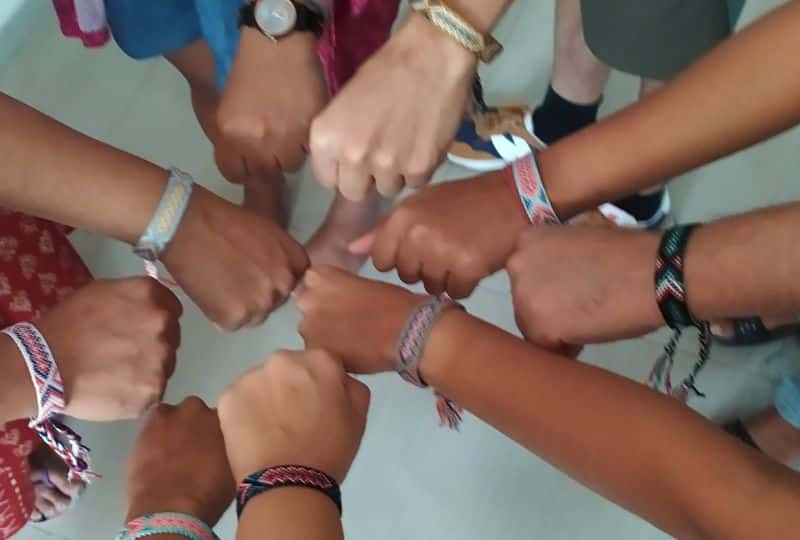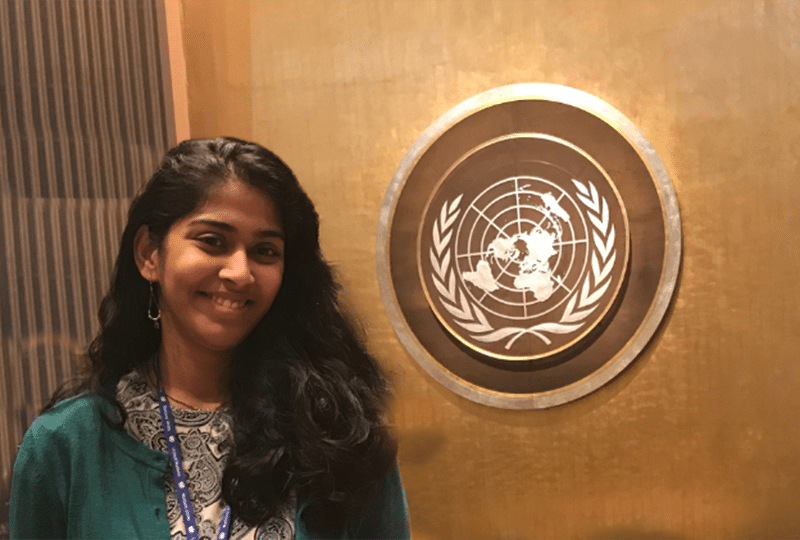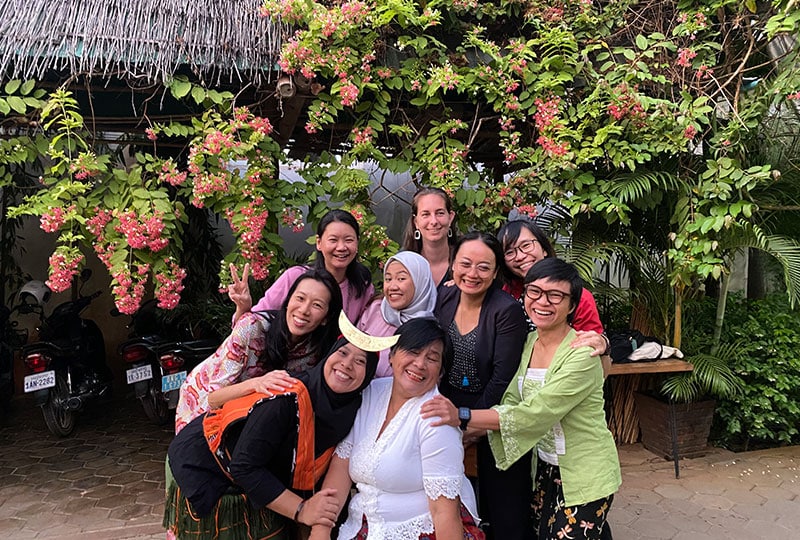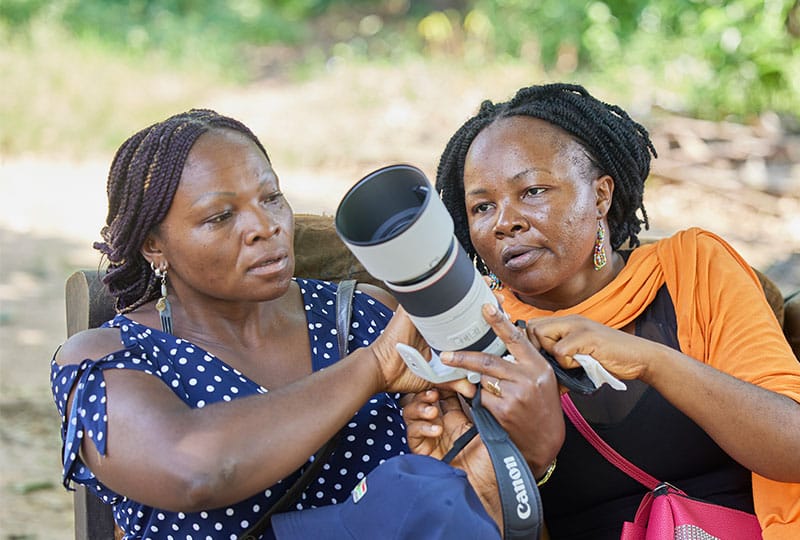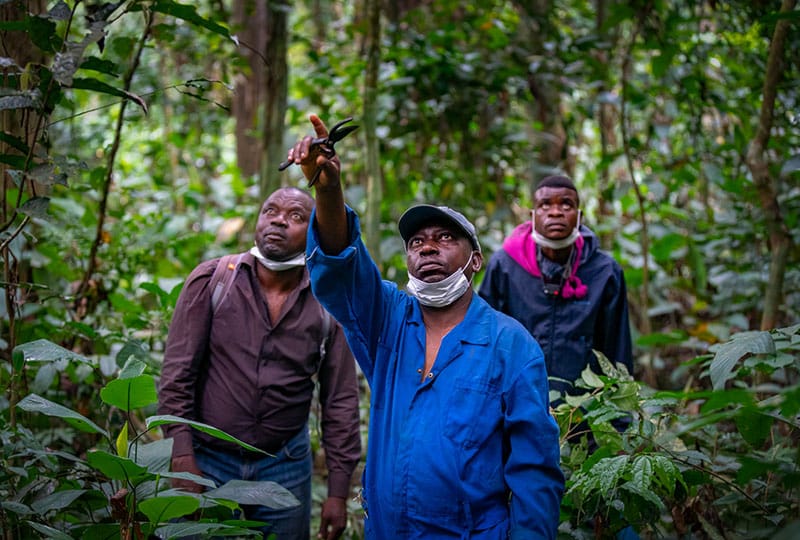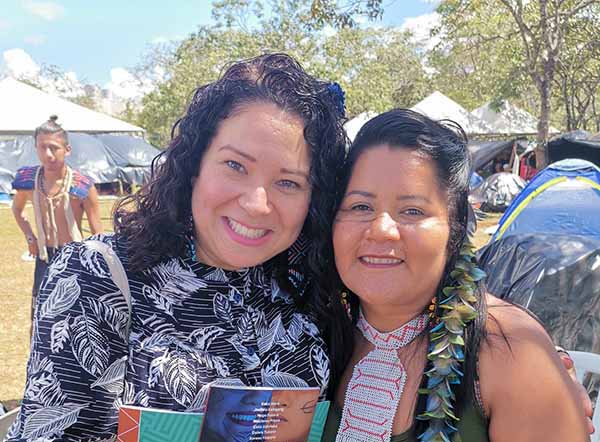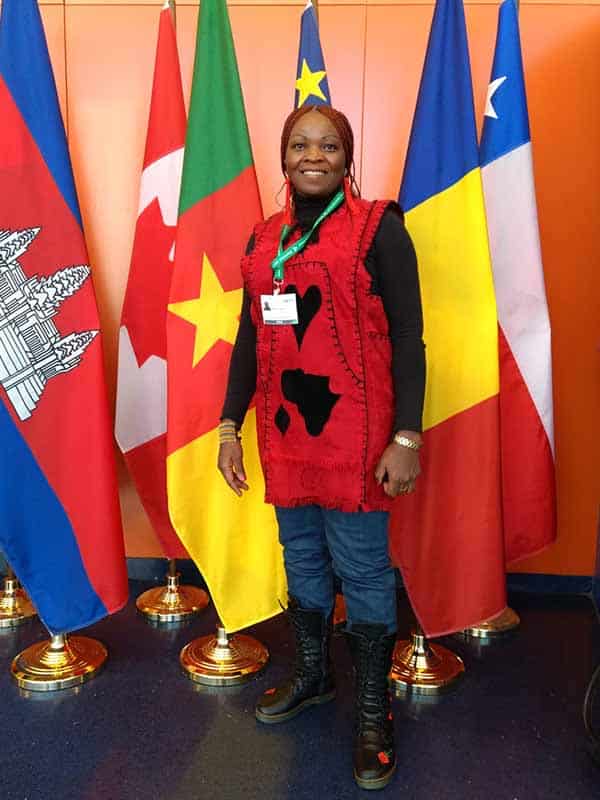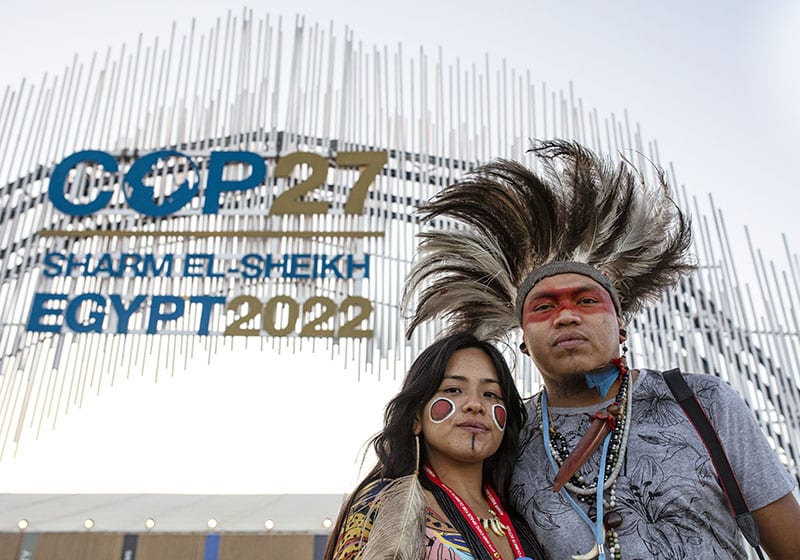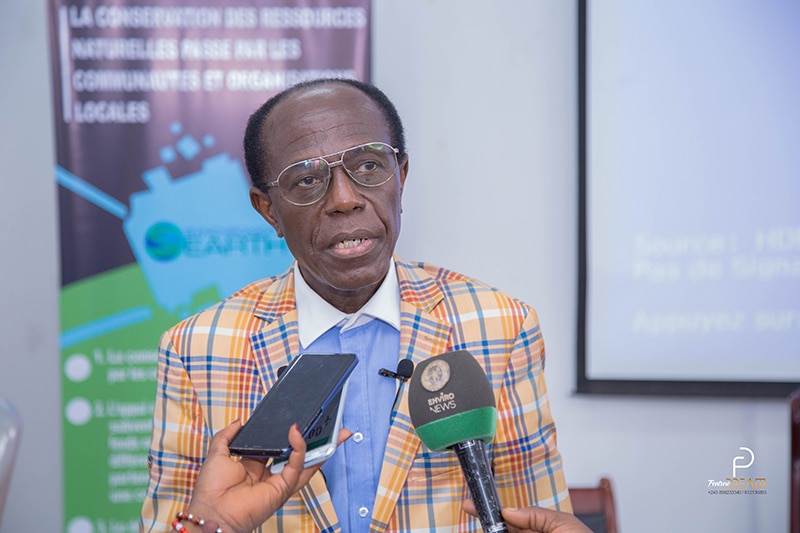Supporting our partners
Developing, learning, and growing
Supporting the development and growth of the people and organisations we fund is built into our approach. Since 2009, we have worked with over 180 organisations, often – but not always – smaller, community-led NGOs and CSOs operating in the global South, gaining deeper understanding of what effective support looks like. We understand the importance of developing strong relationships based on mutual understanding and respect; we recognise the value in funding core activities and staffing, and providing training and skills development where they are needed and appropriate; and we know that long-term support is key to protecting and restoring biodiversity.
For many younger, emerging conservationists in our focal regions, particularly women, the path to conservation leadership is often particularly challenging. We support emerging female conservation leaders, providing funding and helping them to establish their own organisations, or scale up their research projects. And wherever we can, we explore opportunities to bring partners together, regionally, nationally, or internationally, to support shared learning, facilitating and inspiring the exchange of knowledge and practice.
The approach brings flexibility and supports the sense of ‘being in this together’ that Synchronicity Earth brings to its relationships with partners.
Merline Touko Tchoko, Congo Basin Affiliate, Synchronicity Earth
How we support our partners

Organisational development and skills

Supporting emerging women conservationists

Sharing learning, knowledge, and practice
Organisational development and skills
Where our partners identify the need to develop particular skills, capacities, or types of infrastructure, Synchronicity Earth works with them to provide resources and capacity support. This may include providing access to our own staff and affiliates, training courses or academic affiliations, mentorship, creating co-learning opportunities or simply providing core funding to allow employment of the people with the skill sets needed. We are continually learning and striving to improve the support we provide to help our partners fulfil their potential.
Case Study: Training and mentorship
In 2022, we commissioned a training and mentorship programme ‘Essentials of NGO Management’ in collaboration with the IUCN SSC Asian Species Action Partnership (ASAP) and Stone Soup Consulting.
Many of our partners in Southeast Asia are small conservation organisations that often have employees fulfilling a multitude of roles simultaneously which poses a challenge to efficiency and sustainability. For example, fundraising remains a key challenge for organisations as it limits their ability to focus on long-term strategy development because of the administrative burden of short-term funding cycles. Gaps in their knowledge and expertise often prevent them from scaling their operations and many have expressed interest in developing their capacity further.
This course aimed to develop skills that would fill gaps by providing specialised training in areas such as strategy and planning, HR, communications, fundraising and budgeting. Through this programme, we collaborated with the Asian Species Action Partnership to support nine conservation organisations operating in Indonesia, Vietnam, Cambodia, Lao PDR, and Malaysia.
Feedback and enthusiasm from the participants was very positive, with some partners already applying the techniques they learned in practice. We recognise that one-off training courses are just one tool that can be used to build capacity within the sector, so we are actively exploring the most effective ways to follow up on the course and support participants to make the best use of what they learnt.
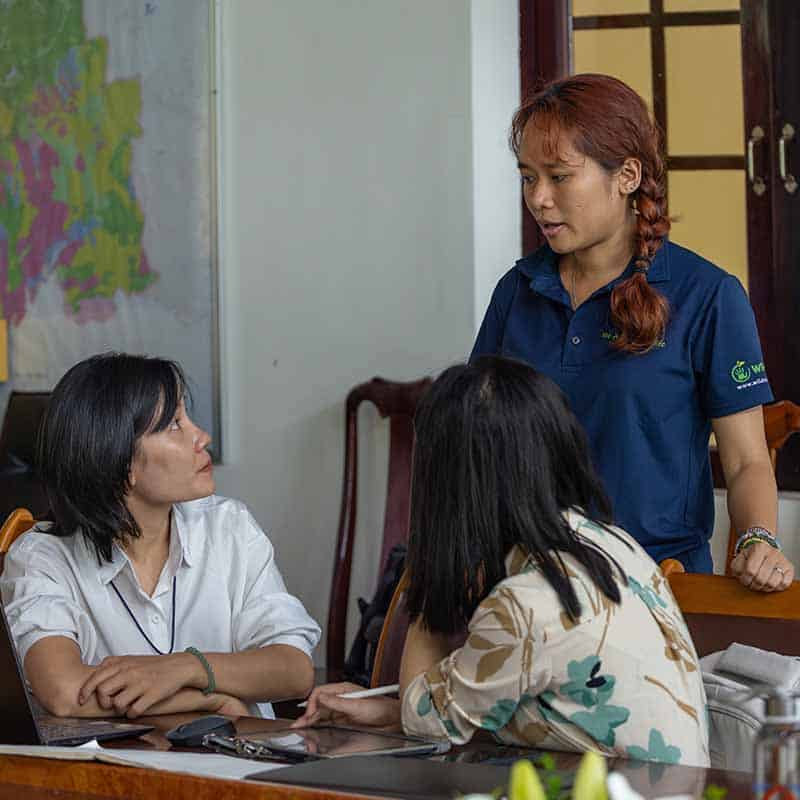
WildAct (Vietnam) is one of the partners Synchronicity Earth supported on Essentials of NGO Management, a course jointly managed and supported by Asian Species Action Partnership, run by Stone Soup consulting. Image © Chris Scarffe
Very useful and interesting. Cannot wait to apply some of these techniques. Thank you!
Joko Guntoro, Satucita Foundation
Supporting emerging women leaders in conservation
Women play an immensely important role in the conservation world. From contributing ground-breaking research, to upholding traditional local knowledge, women are often the frontline of preserving nature and nurturing the communities around them. But for many women in conservation, these roles often come with extra hurdles and challenges. In 2023, 64% of our partners had women in leadership roles, and we are striving to increase this. By 2027, we plan to ensure 80% of the organisations we support have women in leadership positions.
Case Study: Busting myths around amphibians
In the cloud forests around Laj chimel, in the Guatemalan community of Quiché, salamanders are known by the locals as ‘niño dormido’ – sleeping child. While conducting research as part of her EDGE Fellowship, María Chang realised that a lack of knowledge around some amphibian species was contributing to widespread myths and fears around amphibians. She is determined to change perceptions among the local community, recognising that to do this well, she needed to build trust with local landowners and ensure that, in this remote region that is largely forgotten by the state, conservation must go hand in hand with development opportunities and alternative sources of income.
Synchronicity Earth is supporting María to continue her work with the community to ensure better protection for amphibian species in the region and inspire people to become guides to identify amphibian and reptile species, help implement biosecurity measures to prevent the spread of diseases affecting amphibians, and collect data to better understand the presence of amphibians in this remote area.
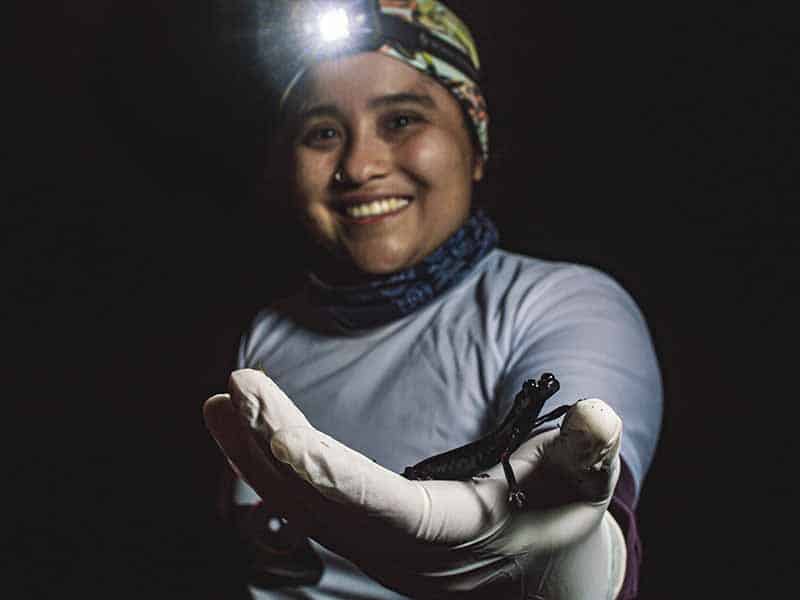
María Chang, a Guatemalan scientist with a speciality in salamanders. Image © Renato Morales
My desire to work with amphibians was born in the cloud forests of Quiché (…). ‘Tuutz’ means frog in the K’iche Maya language, and by using this name in their language, we hope the community will feel a connection to the project and understand that we are working for the animals that inhabit the forests that belong to them.
Promoting shared learning
It is essential that partners have access to networks which connect them to each other and to those working at larger scales, so that they can see how their work fits into a larger picture, exchange knowledge and strategies, and bolster each other’s efforts. We aim to help bring partners facing similar challenges together to exchange ideas and experience. For example, at their request, we are convening collaboration with a number of partners across all our programmes who are working against threats of dams and mining to compare the approaches they are taking and see where collaborations are possible. We are committed to exploring opportunities to share learning and practice between our partners, and across programmes and regions.
Case study: A ‘mini conservation congress’ in Kinshasa
In 2021, the IUCN World Conservation Congress was held in Marseille, France. In the context of increased travel restrictions during the COVID-19 pandemic it proved impossible for our Congo Basin partners to attend. This disenfranchised a huge swathe of IUCN member organisations, and risked vital voices being neglected in decision-making.
In response, Synchronicity Earth staff and affiliates organised a ‘mini-Congress’ in Kinshasa, Democratic Republic of Congo, an event to bring together partner organisations from the Congo Basin that were unable to attend.
Four of our Congo Basin partners are IUCN members and were able to vote in the IUCN election and motions by nominating Synchronicity Earth to vote on their behalf; our staff attended to represent our partners and ensure that their votes were counted. A key moment at the Congress was when the vote on the Inga motion was passed. This represented a huge success for members of Congolese civil society who have spent years advocating to ensure local communities affected by the Inga I and II dams understand their rights and supporting them to access justice.
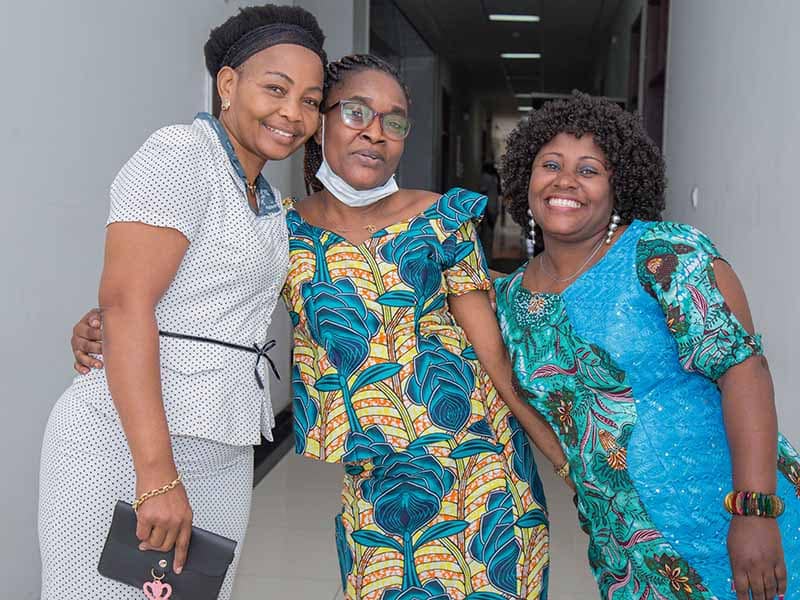
The Kinshasa ‘mini-Congress’ brought our partners together to share learning and practice in conservation in the Congo Basin at the occasion of the IUCN World Conservation Congress, 2021. Image © Rachidy Muankoba Ikulu
Capacity News
To learn more about how you can help us to support our partners, contact us:


